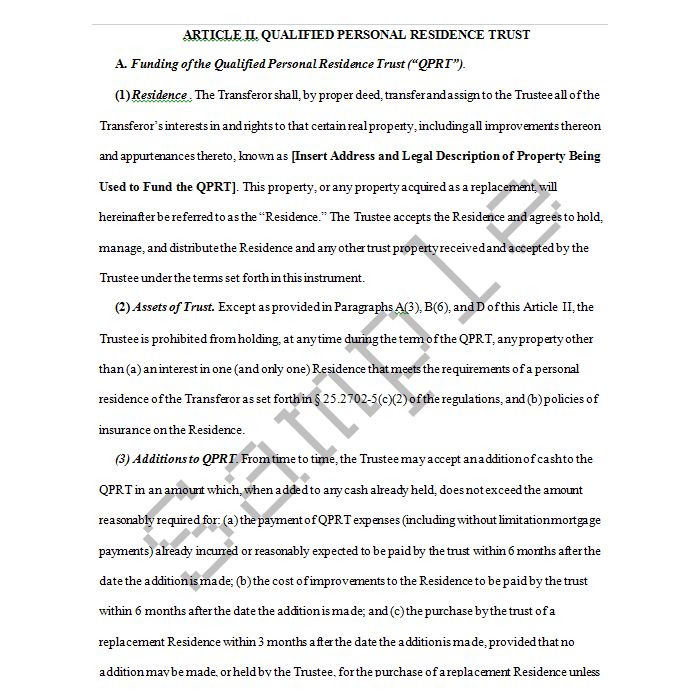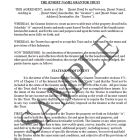2 QPRT Forms Bundle On CD-ROM (28 Pages)
Your CD-ROM will be shipped within 24 hours of purchase
SAVE $39 when you purchase TWO QPRT Forms: Qualified Personal Residence Trust (QPRT) With Possible Return To Grantor AND Qualified Personal Residence Trust (QPRT) With Possible Conversion To A GRAT (Grantor Retained Annuity Trust).
Upon purchase, you will receive an email with a link to each of the fully-editable and downloadable QPRT Forms. Each form will also be stored in your master account on www.nlfforms.com for your unlimited use. Click "Learn More" for a detailed description of each QPRT Form included in this bundle.
In order to purchase a QPRT Form individually, please click "Estate Planning" on the homepage.
Your CD-ROM will be shipped within 24 hours of purchase
Qualified Personal Residence Trust (QPRT) With Possible Conversion To A GRAT (Grantor Retained Annuity Trust) (16 Pages)
This document is a form of a Qualified Personal Residence Trust (QPRT). It satisfies the requirements issued by the Internal Revenue Service in Rev. Proc. 2003-42 for a single term holder for the shorter period of a selected term of years or the life of the holder.
This Form provides that if the personal residence is sold during the QPRT term, the proceeds continue to be held in a Grantor Retained Annuity Trust (GRAT) to preserve the tax-favored gifting benefits commenced with the QPRT transaction. The evolution into the GRAT is not required. The QPRT could, alternatively, be allowed to expire on the sale of the residence, with the cash being returned to the grantor. That would, of course, negate the originally-desired tax benefits of this transaction.
Planning with QPRTs suggests having jointly-owned real estate by spouses divided into a tenancy-in-common arrangement, with each spouse then creating his or her own QPRT. That will allow discounts for lack of control and lack of marketability. Attention should also be paid to the named beneficiaries should the grantor die before the end of the QPRT term and have the property included in the grantor’s taxable estate. If the named beneficiary is the grantor’s spouse, the marital deduction will defer tax until the spouse’s death. If the named beneficiary is the grantor’s estate, it may be possible to coordinate the marital deduction and the applicable exclusion through disclaimers or other planning to minimize the tax impact of a death before the QPRT term ends.
Since a QPRT is a grantor trust, it is acceptable for the grantor to serve as the trustee during the QPRT term. However, when the term ends, a new trustee should be provided to avoid any implication that the grantor has retained an interest after the QPRT term that could force the residence to be included in the grantor’s estate.
Qualified Personal Residence Trust (QPRT) With Possible Return To Grantor (12 Pages)
This document is a form of a Qualified Personal Residence Trust (QPRT). It satisfies the requirements issued by the Internal Revenue Service in Rev. Proc. 2003-42 for a single term holder for the shorter period of a selected term of years or the life of the holder.
This Form provides that if the personal residence is sold or otherwise fails to qualify as a QPRT during the QPRT term, the proceeds of sale, involuntary conversion, etc. are returned to the transferor. An alternative Form may provide that instead of returning proceeds to the transferor, the proceeds continue to be held in a Grantor Retained Annuity Trust (GRAT) to preserve the tax-favored gifting benefits commenced with the QPRT transaction. The evolution into the GRAT is not required.
Planning with QPRTs suggests having jointly-owned real estate by spouses divided into a tenancy-in-common arrangement, with each spouse then creating his or her own QPRT. That will allow discounts for lack of control and lack of marketability. Attention should also be paid to the named beneficiaries should the grantor die before the end of the QPRT term and have the property included in the grantor’s taxable estate. If the named beneficiary is the grantor’s spouse, the marital deduction will defer tax until the spouse’s death. If the named beneficiary is the grantor’s estate, it may be possible to coordinate the marital deduction and the applicable exclusion through disclaimers or other planning to minimize the tax impact of a death before the QPRT term ends.
Since a QPRT is a grantor trust, it is acceptable for the grantor to serve as the trustee during the QPRT term. However, when the term ends, a new trustee should be provided to avoid any implication that the grantor has retained an interest after the QPRT term that could force the residence to be included in the grantor’s estate.
Author:
Steven G. Siegel is president of The Siegel Group, a Morristown, New Jersey - based national consulting firm specializing in tax consulting, estate planning and advising family business owners and entrepreneurs. Mr. Siegel holds a BS from Georgetown University, a JD from Harvard Law School and an LLM in Taxation from New York University.
He is the author of several books, including: Planning for An Aging Population; Business Entities: Start to Finish; Taxation of Divorce and Separation; Income Taxation of Estates and Trusts, Preparing the Audit-Proof Federal Estate Tax Return, Putting It Together: Planning Estates for $5 million and Less, Family Business Succession Planning, Business Acquisitions: Representing Buyers and Sellers in the Sale of a Business; Dynasty Trusts; Planning with Intentionally-Defective Grantor Trusts; The Federal Gift Tax: A Comprehensive Analysis; Charitable Remainder Trusts, Grantor Trust Planning: QPRTs, GRATs and SCINs, The Estate Planning Course, The Retirement Planning Course, Retirement Distributions: Estate and Tax Planning Strategies; The Estate Administration Course, Tax Strategies for Closely-Held Businesses, and Tort Litigation Settlements: Tax and Financial Issues.
Mr. Siegel has lectured extensively throughout the United States on tax, business and estate planning topics on behalf of numerous organizations, including National Law Foundation, AICPA, CCH, National Tax Institute, National Society of Accountants, and many others. He has served as an adjunct professor of law at Seton Hall and Rutgers University law schools.
The Siegel Group provides consulting services to accountants, attorneys, financial planners and life insurance professionals to assist them with the tax, estate and business planning and compliance issues confronting their clients. Based in Morristown, New Jersey, the Group has provided services throughout the United States. The Siegel Group does not sell any products. It is an entirely fee-based organization.
Contact the Siegel Group through its president, Steven G. Siegel, e-mail: [email protected]




